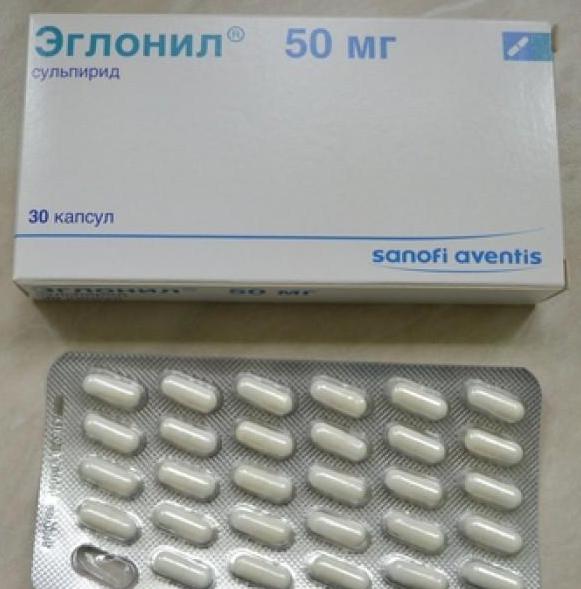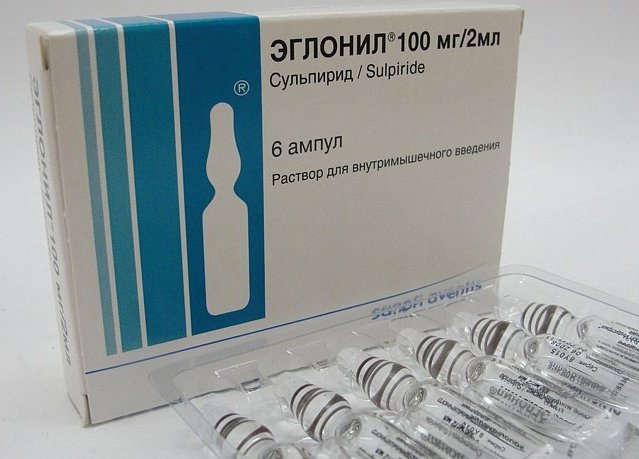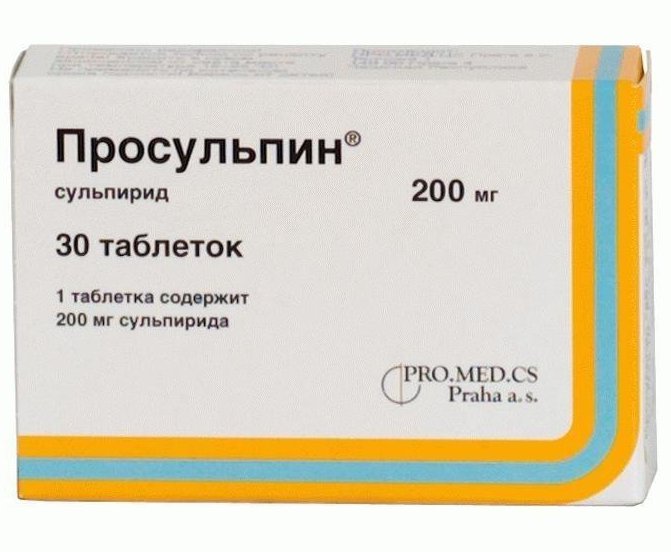"Eglonil": instructions for use, indications, release form, analogues and reviews
In psychiatric practice, Eglonil is often used. Instructions for use recommends the use of this medicine for apathetic and depressive disorders. The drug is also prescribed by therapists for the treatment of psychosomatic pathologies. Experts note that this remedy has a milder effect than other antipsychotic drugs. It usually does not require additional corrective medication to mitigate unwanted effects and is well tolerated.
Composition and forms of release
The active substance of the drug is sulpiride. The drug is produced in the form of tablets, capsules and injection solution.
The tablet form is produced with an active ingredient content of 200 mg. The composition of the drug includes additional substances: starch, talc, magnesium and silicon compounds, as well as lactose and cellulose. These ingredients help the absorption of the drug. Tablets "Eglonil" are white with a yellowish tinge. On one of their sides, the inscription "SLP 200" (active ingredient content) is engraved.
The capsules are coated with gelatin. They contain 50 mg of the active substance and are white or yellowish gray in color.
The solution for injection includes 50 mg of sulpiride. It is a transparent, odorless liquid, it is poured into ampoules of 2 ml. The preparation also includes distilled water, sulfuric acid and sodium chloride. Eglonil injections are made into the gluteal muscle.
How does the medicine work?
To understand the action of the drug, it is necessary to understand the biochemistry of the central nervous system. The human body produces a substance - dopamine. It is called the "hormone of pleasure", as it is responsible for the emotional background and uplifting. However, an excess of this substance is harmful and can lead to brain disorders. Sulpiride blocks dopamine receptors and thereby reduces the manifestations of psychosis.
However, this substance acts selectively. Sulpiride blocks receptors only in the limbic system of the brain. The accumulation of dopamine in this area leads to delusions, hallucinations, and other manifestations of schizophrenia and other mental illnesses. Sulpiride does not cause feelings of depression and inhibition. On the contrary, it eliminates apathy, increases a person's activity and works as a mild stimulant.
Is Eglonil an antidepressant? Strictly speaking, this means belongs to neuroleptics. But it helps well with depression with manifestations of apathy. Its effect on the body depends on the amount of the drug. In high doses, it acts as an antipsychotic, and in small doses, it affects the symptoms of depression. These drugs are called atypical antipsychotics.
Sulpiride also eliminates excitation in the hypothalamus. This helps to improve blood circulation and the formation of mucus in the digestive tract. This action allows the use of the drug for ulcers of origin and irritable bowel syndrome. Sulpiride also calms the vomiting center in the brain, so the medicine is used for nausea.
In small doses, sulpiride eliminates dizziness in vegetative-vascular dystonia due to a calming effect on the central nervous system.
This medicine affects the hormonal background in women and men, stimulating the secretion of prolactin. This can be attributed to the disadvantages of the drug. Many atypical neuroleptics have this property. However, endocrine disorders when taking this medication are temporary and disappear when the dose is reduced or the drug is discontinued.

Indications for use
Why appoint "Eglonil"? The list of indications for the use of the drug is quite extensive. It includes both psychiatric and somatic diseases:
- The medicine helps with depression with manifestations of apathy and anxiety. In this case, small doses of the drug are used.
- The drug is able to reduce the manifestations of apato-abulic syndrome. This serious condition is characterized by a decrease in activity and will, a feeling of constant fatigue, and a loss of interest in any activity. It is most often seen in schizophrenic disorders. This syndrome is difficult to treat, but the drug "Eglonil" is able to increase the patient's activity due to the stimulating effect.
- Tablets and injections of the drug are prescribed for schizophrenia with delusions and hallucinations. In such cases, the use of large dosages is indicated. Also, the drug is used in other conditions with manifestations of delirium.
- "Eglonil" for neurosis is prescribed only for adult patients, if other means are ineffective.
- In child psychiatry, medicine is also used. It helps with behavioral disorders in a child: motor restlessness with nervous excitement, obsessive repetitive actions, self-damage. This remedy is especially effective in the treatment of such disorders in autistic people. However, children can use the medicine only in capsules of 50 mg and at the age of at least 6 years.
- The neuroleptic eliminates pain in stomach ulcers and irritable bowel syndrome, if these diseases are caused by stress.
- The drug can be used as an antiemetic, especially in patients undergoing chemotherapy.
- "Eglonil" reduces migraine headaches. Also, the medicine eliminates dizziness with VVD, panic attacks and neuroses.
The drug has an antidepressant effect, but this does not mean that the drug can be taken alone with low mood or stress. Temporary emotional distress is not an indication. "Eglonil" can only be prescribed by a doctor. This is strictly with a pronounced effect on the psyche. It has many contraindications and side effects that only a specialist can take into account.

When is the drug contraindicated?
The drug can not be taken by all patients. Instructions for use "Eglonil" reports the following contraindications:
- Tumors of the pituitary and mammary glands. The medicine increases the production of prolactin. It is contraindicated in neoplasms, if their growth depends on the level of this hormone. Also, the medication is not prescribed for endocrine disorders associated with an increase in prolactin.
- Allergic reaction to sulpiride. In this case, the use of the drug should be abandoned. Tablets should not be taken by patients with lactose intolerance, this form of medication should be replaced with capsules or injections.
- Aggressive behavior in psychosis and the manic phase of bipolar disorder. "Eglonil" can increase arousal.
- Poisoning with alcohol and sedatives. The antipsychotic exacerbates respiratory depression and other functions.
- Tumors of the adrenal glands. The drug can provoke their growth.
- Pregnancy. During the period of bearing a child, the medicine is prescribed only when absolutely necessary. In this case, the doctor weighs the expected benefits for the woman and the likelihood of risk to the unborn baby. The medicine has an antiemetic effect, but it should not be taken to eliminate nausea during pregnancy toxicosis.
- Lactation. If sulpiride is prescribed during this period, then breastfeeding should be interrupted. The active ingredient of the drug passes into milk.
- Tablets and injections are not used in the treatment of children and adolescents under 18 years of age. Capsules can be prescribed from 6 years of age.
Care must also be taken in the treatment of elderly people, patients with epilepsy, pathologies of the liver and kidneys, cardiovascular ailments and parkinsonism. In these cases, the appointment of a reduced dosage and monitoring of the patient's condition is required. Caution is also necessary when prescribing atypical antipsychotics to women with menstrual irregularities, since the drug affects the hormonal background.
Undesirable manifestations
Side effects of "Eglonil", first of all, are reflected in the work of the nervous and endocrine systems. Extrapyramidal symptoms (increased muscle tone with involuntary movements) are much less common than with typical antipsychotics. However, there may be spasms of the muscles of the neck and mouth, a violation of the movements of the eyeballs and tongue. Such dyskinetic symptoms can be treated with antiparkinsonian medications. Some patients develop increased drowsiness, trembling in the limbs, dizziness.
As already mentioned, sulpiride increases prolactin levels. Hormonal disorders are associated with this while taking Eglonil. In women, menstrual irregularities occur, up to the cessation of menstruation, the release of milk from the mammary glands, in men - gynecomastia and a decrease in potency. If the patient requires a long course of treatment, then a blood test for prolactin should be taken periodically.
Often there is an increase in weight during treatment with neuroleptics. This is also due to the reaction of the endocrine system to the drug. During the period of therapy, you should control your diet, the number of calories consumed should be limited.
It should be noted that all hormonal changes when taking antipsychotics are reversible. When the drug is discontinued, the disorders disappear and the hormonal background returns to normal.
Instructions for use "Eglonil" also reports other undesirable effects. In patients with hypersensitivity to the active ingredient, an allergy with skin rashes may occur. In some patients, arrhythmia, palpitations and pressure surges are noted when the body position changes.
The most dangerous side effect is It occurs quite rarely with the use of atypical antipsychotics. But still, there is a risk of its occurrence, especially if the permissible dose is exceeded or when Eglonil is taken with incompatible drugs. A person's temperature rises sharply (up to + 39-41 degrees), motor and mental excitement occurs, muscles become extremely tense. With such manifestations, the neuroleptic should be urgently canceled. If, while taking the drug "Eglonil", the patient has an elevated temperature, you should immediately inform the doctor about this.
The prescribed dosage of the drug should be carefully observed. It is extremely dangerous to use an antipsychotic in large quantities, it can cause serious poisoning. In case of an overdose, a person experiences muscle spasms, uncontrolled movements, blurred vision, dry mouth, nausea, lethargy. Sometimes there are signs that resemble those of Parkinson's disease. In case of poisoning with the drug, a person needs to rinse the stomach and urgently call a doctor. There are no specific antidotes for sulpiride. In the hospital, the patient is given symptomatic treatment: they support cardiac and respiratory activity, they give drugs from the group of anticholinergics.
How to apply the drug?
The dosage is selected by the attending physician depending on the disease and the patient's condition. In psychotic disorders with delusions and hallucinations, Eglonil injections are used. The drug is injected into the gluteal muscle. On average, from 400 mg to 800 mg of the drug is required per day. Injections are made 1-3 times a day. The duration of such treatment is about 14 days. After the patient's condition improves, the drug continues to be taken, but in the form of tablets or capsules.

If the medicine is taken orally, then it should be taken in the morning, up to about 16 hours. This remedy has an activating effect, and if taken in the evening or at night, there may be problems with falling asleep. It must be remembered that this antipsychotic is neither a sleeping pill nor a sedative.
On average, the following daily dosages of Eglonil capsules and tablets are used:
- schizophrenia and depression: 200-1000 mg;
- neurosis, psychosomatic disorders and nausea: 50-150 mg;
- behavioral disorders in children: 5 to 10 mg per 1 kg of the child's weight.
For the elderly, the adult dose is reduced by 2-4 times. The medicine is taken 1-3 times a day.
If the course of treatment comes to an end, or it is required to cancel the drug, then the dose is reduced gradually. You should not abruptly stop taking the medicine. It is believed that this antipsychotic is not addictive and addictive. However, many patients have Eglonil withdrawal syndrome. It is characterized by apathy, depressive mood, loss of strength, loss of appetite, nausea, autonomic disorders. To avoid this unpleasant condition, the drug is canceled within 1-2 weeks, gradually reducing the daily dose.
special instructions
During the course of treatment, you must completely refrain from drinking alcohol. "Eglonil" and alcohol are incompatible. Their simultaneous reception leads to severe intoxication. Sulpiride interacts with ethanol. In this case, severe symptoms may occur, reminiscent of the reaction of difilsuram (Esperal) and alcohol. There is reddening of the face, a feeling of heat, severe headache, nausea, shortness of breath, tachycardia. If the patient violated the ban on the use of ethanol during treatment, it is urgent to call a doctor. You can drink a little alcohol only a month after the end of the course of therapy.

Instructions for use "Eglonil" reports that during the course of treatment should refrain from driving a car. This tool affects the concentration of attention. You should also avoid activities that require a high reaction rate.
How does a neuroleptic interact with other medicines?
The drug should not be taken together with the following medicines:
- Typical antipsychotics, antiarrhythmics and some antibiotics. Their simultaneous administration with sulpiride can cause severe tachycardia.
- Drugs for Parkinson's disease. Their effect on the body is directly opposite to the influence of "Eglonil".
- Calcium channel blockers and medicines that lower potassium levels. This technique can cause ventricular arrhythmia.
If the patient is taking such drugs, the doctor should be informed. Instructions for use "Eglonil" recommends caution when taking a neuroleptic with anti-pressure drugs, as it enhances the hypotensive effect.
Sulpiride is often prescribed as part of the complex therapy of mental illness, along with antidepressants and sedatives. However, caution is also needed here, such a combination of drugs can depress breathing.
Storage, price and analogues
Tablets and capsules are stored at a temperature not exceeding +30 degrees. They are usable for 3 years. The same storage conditions are provided for ampoules with a solution.
The price of tablets (12 pieces) in pharmacy chains ranges from 250 to 350 rubles. Capsules of the drug (30 pieces) cost from 170 to 230 rubles. The price of 6 ampoules of injection solution is from 290 to 370 rubles.
Patients are often interested in analogues of "Eglonil". In pharmacies, you can find the following drugs with the active ingredient - sulpiride:
- "Betamax";
- "Sulpiride belupo";
- "Prosulpin";
- "Depral".
The cost of the drug "Betamax" is from 170 to 230 rubles. The most economical options are the drugs Sulpiride Belupo and Prosulpin. Their price ranges from 95 to 170 rubles. These medicines are available in tablet form.

By the therapeutic effect can be attributed to the drug "Solian". It contains the active ingredient amisulpride. This substance is very similar to sulpiride in terms of effects on the body. There are many good reviews from patients about this drug, people note its high effectiveness in depressive-apathetic disorders. However, Solian is an expensive medicine. Its price is from 3500 to 6500 rubles.














